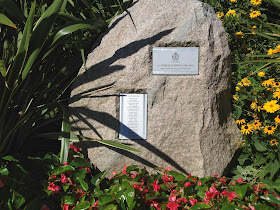The rock with the poem is just to the left in this spot.
I was reminded, by the recent post about walking at the Riserva Naturale at Fondatoce, and the poem I mentioned having seen, about yet another poem I saw, this one while walking along the Lungolago. I had noticed this large rock, found pretty much in the area in the photo above, with two small plaques; here are photos of them:

The horizontal plaque on the upper right indicates it is a gift in memory of poet and scholar Clemente M. Rebora. It shows the years of his life as from 1885 to 1957.
( Continued ... )
Born in Milan, Rebora became a devout Christian in 1930, after varied careers and life-altering experiences, and a Rosminian priest in 1936. Hence, his connection with Stresa. Below, an image of the vertical plaque, engraved with one of his most famous poems:
Following the taking of the photos a little bit of research ensued. We discovered that this poem, Dall'Imagine Tesa, is considered Rebora's masterpiece. It was a part of his second collection of poems, Cante anonimi, Anonymous Songs. I can tell you that it was written at the time of his spiritual awakening, is considered, as well as a masterpiece, also one of the most highly religious contemporary poems, and that the plaque displays the entire 26-line poem.
Here's the text of the poem, copied clearly:
Dall’imagine tesa
Dall'imagine tesa
vigilo l’istante
con imminenza di attesa -
e non aspetto nessuno:
nell’ombra accesa
spio il campanello
che impercettibile spande
un polline di suono -
e non aspetto nessuno:
fra quattro mura
stupefatte di spazio
più che un deserto
non aspetto nessuno:
ma deve venire,
verrà, se resisto
a sbocciare non visto,
verrà d’improvviso,
quando meno l’avverto:
verrà quasi perdono
di quanto fa morire,
verrà a farmi certo
del suo e mio tesoro,
verrà come ristoro
delle mie e sue pene,
verrà, forse già viene
il suo bisbiglio.
Translating was difficult, and eventually we found a translated version online. In either language I find the poetry very full of imagery and emotion. One scholar, Margharita Marchione, said of it, [It is] "the most religious and the most vibrant Italian lyric of our time."
Toward the end of his life Rebora spoke of this poem. He explained that the 'image' in the poem was his own face, gazing to the unknown, and waiting for a longed-for revelation. He said also, of that whisper mentioned in the last lines, "God's voice is subtle, almost unnoticeable, is just a buzzing. If you get accustomed to it, you can hear it everywhere." Below is the translation we found of the poem. So, when you're walking past it on the Lungolago, stop and pause and think of Clemente Rebora, who must have been affected by the beautiful scenery in front of him, as are we all.
From the aimed image
I am keeping watch on the instant
With imminence of wait
And I am not waiting for anybody
In the lit shade
I am spying upon the bell
Which, imperceptible, is spreading
A pollen of sound –
And I am not waiting for anybody
Between four walls
Astonished of space
More than a desert
I am not waiting for anybody:
But he must come;
He will come, if I resist,
To blossom not seen,
He will come all of a sudden,
When I least realize:
He will come almost pardon
Of what he makes die,
He will come to make me certain
Of his and my treasure,
He will come as a relief
Of my and his pains,
His whisper
Will come, perhaps it is already coming


